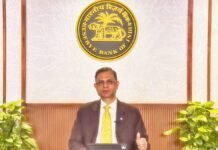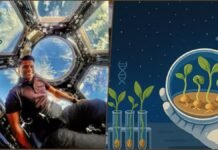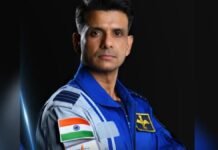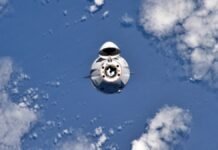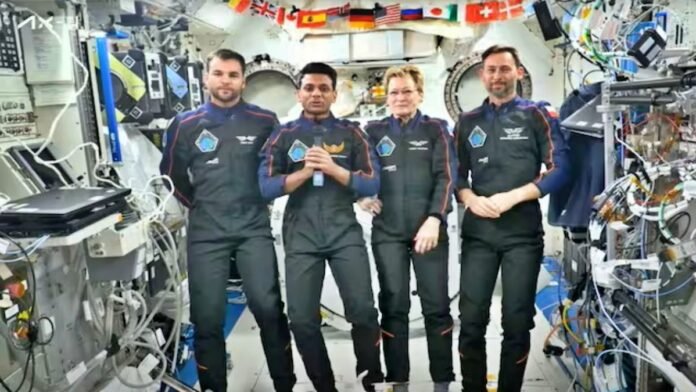
Key Points
- Shubhanshu Shukla, pilot of the Axiom-4 mission, is scheduled to return to Earth from the International Space Station (ISS) on July 15 at 3 pm.
- The mission, led by veteran astronaut Peggy Whitson, included three other astronauts and lasted 14 days.
- Axiom-4 crew conducted advanced biomedical, nanomaterial, and microalgae research aboard the ISS.
- Astronauts will undergo a 7-day rehabilitation program post-landing to recover from the effects of microgravity.
- NASA has approved the undocking and return schedule, with a margin window of about one hour for timing adjustments.
New Delhi: Indian astronaut Shubhanshu Shukla, serving as the pilot on the Axiom-4 mission, is preparing for his return to Earth after a successful 14-day stint aboard the International Space Station. The mission, led by Commander Peggy Whitson, included a diverse international crew and focused on cutting-edge scientific research in microgravity.
Return Timeline
- Undocking: Scheduled for July 14 at 4:30 pm IST.
- Re-entry and Landing: Expected on July 15 at 3 pm IST, with a one-hour flexibility window to accommodate any last-minute changes.
- Spacecraft: The crew will return aboard the SpaceX Dragon capsule, carrying both astronauts and valuable scientific samples.
What Did Shubhanshu Shukla and Crew Do in Space?
During their time on the ISS, the Axiom-4 team conducted a series of experiments aimed at advancing human knowledge and technology for future space missions:
- Biomedical Research: Blood samples were collected to study the effects of microgravity on human physiology.
- Microalgae Studies: Investigated as a sustainable food source and for life support systems in space, microalgae could play a vital role in long-duration missions.
- Nanomaterial Research: Focused on developing wearable health-monitoring devices for astronauts, enhancing safety and performance.
- Electrical Muscle Stimulation: Explored to counteract muscle atrophy caused by prolonged weightlessness.
- Thermal Comfort Suit Testing: Evaluated new materials designed to regulate astronaut body temperature.
- Behavioral Studies: Monitored crew interactions and adaptation to the space environment.
The astronauts also spent their final days packing equipment and research samples for safe return to Earth.
Why Is a 7-Day Rehabilitation Program Needed?
After spending time in microgravity, astronauts experience muscle weakening, reduced balance, and changes in cardiovascular function. To ensure a smooth transition back to Earth’s gravity, NASA has developed a tailored 7-day rehabilitation program for the Axiom-4 crew.
Rehabilitation Focus Areas
- Initial Phase: Emphasis on walking (ambulation), cardiovascular fitness, and flexibility exercises to restore basic mobility and health.
- Progressive Training: Gradual increase in exercise intensity, including proprioceptive training to improve balance and coordination.
- Functional Development: Activities designed to help astronauts regain the ability to perform everyday tasks confidently.
Throughout rehab, astronauts are closely monitored by medical professionals to ensure safe and effective recovery.
How Is Rehabilitation Duration Decided?
The length of an astronaut’s rehabilitation depends on the total time spent in space:
| Mission Duration | Typical Rehab Period |
|---|---|
| Short (10–20 days) | 7–10 days |
| Medium (1–3 months) | 2–4 weeks |
| Long (6+ months) | 4–8 weeks or more |
For example, Shubhanshu Shukla’s 18-day mission warrants a 7-day rehab, while astronauts like Sunita Williams, who spent over 600 days in space, required up to 45 days of rehabilitation.
The Significance of the Axiom-4 Mission
- International Collaboration: Showcases India’s growing role in global space exploration.
- Scientific Impact: The experiments conducted will contribute to advancements in space medicine, materials science, and life support systems.
- Inspiration: Shukla’s journey highlights the potential for future Indian astronauts and the nation’s commitment to space research.
As Shubhanshu Shukla and his crewmates prepare for their return, their achievements mark another milestone in India’s space story—bridging science, international cooperation, and the human spirit of exploration.













